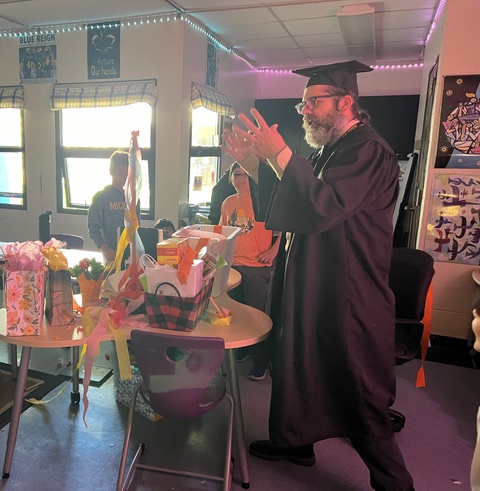Wayne State alum brings philosophy to the elementary classroom

Philosophy is a subject most people don’t explore until their college years, but in Wayne State alumnus Eric Musehl’s class, children as young as 10 years old learned how to “understand big ideas by asking big questions.”
After receiving his degree in philosophy in 2023, Musehl was given the opportunity to teach four “mini-lessons” to a class of fifth-graders at King Elementary through the University of Michigan Masters in Elementary Education program (ELMAC). The lessons explored fun and interesting questions in metaphysics, ethics, philosophy of language and philosophy of art.
Starting with metaphysics, Musehl focused on the famous Ship of Theseus thought experiment, in which a wooden ship has its parts replaced piece by piece until it no longer has any of its original parts—at which point we ask, “Is it still the same ship?” In choosing where to begin his lessons, Musehl said, “The Ship of Theseus was a really easy one. It’s really approachable and just famous enough that some kids might have already heard of it. They could really chew on it and they really enjoyed that.”
“Ethics was next,” continued Musehl. In this second mini-lesson, he focused on the topic of lying by discussing the plot of the famous children’s book, “Miss Nelson is Missing!” In the book, a kind teacher disguises herself as a cruel substitute, Miss Viola Swamp, in order to show her rambunctious class how to be appreciative of her. “It’s pretty obvious that Miss Nelson is Miss Viola Swamp,” said Musehl, “so then I was able to ask the question[s]: Is it okay for adults to lie to children? What does it mean to lie to your friends? Are there good times to do so? It’s really fun to watch them grapple with that. Happily, we never found a good answer.”
His third mini-lesson focused on philosophy of language through the lens of another children’s book, “Knuffle Bunny.” “[It’s] about a little girl who doesn’t actually talk—she talks baby talk. She’s trying to talk to her father, but he’s not understanding things,” said Musehl. “So, we got to have a conversation about what is and isn’t language.” Musehl later expressed a desire to expand on this lesson in the future by implementing discussions of slang and other types of language.
The final mini-lesson delved into the philosophy of art, which tackled questions like ‘What is blue?’ and ‘What is art?’ Musehl shared one of his video activities, saying “First, I took the visuals out, so all they could do was hear this person drumming—and they were slamming on those drums; they were amazing. Then I showed the visuals, and it’s this 12-year-old girl who’s a YouTube sensation. This is not what they thought! Through that idea, we explored how we think about art.”

Warrior inspired
Musehl says that his time in Wayne State’s philosophy department inspired his work in early philosophy education. “I really started to understand how I can play with philosophy. It doesn’t have to be work. You can really play with it and you can have a good time and jump into some really big difficult questions, and it’s really approachable.” While some may think teaching fifth-graders is nothing like teaching college students, Musehl says, “It’s not that different. When you’re writing your syllabus you have to think about: How am I going to engage these people? What am I going to hook them with? What’s important? Why should they care? What small thing might they take away? All those same things are still there.”
He also admits that they are different in important ways. He says that with fifth-graders, “You definitely are dealing with brains developing and emotions developing… it’s a different energy. … Social and emotional learning is huge. [But] that should be a big conversation with college students, too.”
As a message to other aspiring philosophers, Musehl says, “I think we should be doing our best to help people in any way we can, and I think we shouldn’t be afraid to go hang out with kids. (A) They’re potential collegiate people, which will keep philosophy programs running; and (B) Most [early] educators are not coming into this with a philosophy degree. I think this is a really cool opportunity, especially for a college like Wayne State that’s right in the middle of the city.”
Musehl says that studying philosophy showed him different and better ways to think through situations, what he’s doing with his life, and how he interacts with the world. It seems strange that we aren’t doing more to teach children those things. To this idea, Musehl says, “Right now, there’s going to be at least one classroom that’s going to try.”
If you’re inspired by Eric Musehl’s work and would like to help or otherwise reach out, you can reach him at emusehl@umich.edu.
Griffin Kiegiel, Ph.D. candidate in philosophy